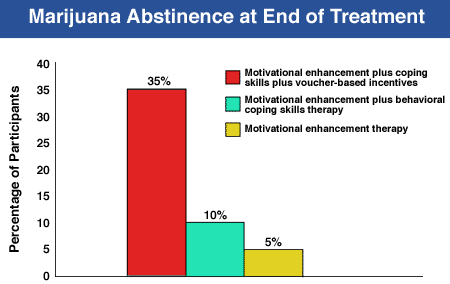 |
Bulletin Board
Volume 16, Number 3 (August, 2001) |
Adding Vouchers to Behavioral Therapies Improves Marijuana Treatment Results
Enhancing behavioral treatments by adding the opportunity to earn vouchers for remaining drug-free has been shown to improve abstinence rates among cocaine- and opiate-addicted patients. Now, a NIDA-funded study has shown that the combination of behavioral interventions and voucher-based incentives also can improve treatment results for heavy marijuana abusers.
 Adding voucher-based incentives to behavioral and motivational treatments more than tripled the percentage of patients who stopped using marijuana by the end of treatment. |
Researchers at the University of Vermont in Burlington, led by Dr. Alan J. Budney, recruited 60 heavy marijuana users who wanted to quit. Most of the study participants had long histories of marijuana abuse, smoked marijuana almost daily, and smoked more than once a day. They were randomly assigned to one of three treatments: motivational enhancement therapy, motivational enhancement plus behavioral coping skills therapy, or motivational enhancement plus coping skills plus voucher-based incentives. Throughout the study, each participant gave urine samples twice weekly to be tested for marijuana use. If patients in the incentives group tested negative, they earned vouchers that they could exchange for retail goods or services, such as movie passes, sporting equipment, or vocational classes. Patients in the other two treatment groups did not receive such tangible rewards for abstinence.
Over the 14-week study, 40 percent of patients in the incentives group achieved at least 7 weeks of continuous abstinence from marijuana, compared with 5 percent of patients in each of the other groups. At the end of the treatment period, 35 percent of the incentives group had stopped using marijuana, compared to 10 percent of the motivational enhancement plus coping skills group and 5 percent of the motivational enhancement group.
The study was published in the December 2000 issue of the Journal of Consulting and Clinical Psychology.
NIDA Supports Addiction Studies Program for Journalists
Wake Forest University School of Medicine in Winston-Salem, North Carolina, has established a NIDA-funded Addiction Studies Program for Journalists to help reporters achieve the highest standards of scientific accuracy when reporting on drug addiction. National Families in Action, a drug abuse education, prevention, and policy center in Atlanta, is cofounder of the program, which conducts 3-day workshops for journalists from the print, broadcast, and electronic media twice a year at Wake Forest.
The workshops give journalists an intensive introduction to the scientific basis of addiction, information about advances in the field of drug abuse research, story ideas, and tips on how to accurately convey drug abuse information to their audiences. The workshops also seek to build lasting relationships between journalists and addiction scientists. A nationally renowned faculty of scientists, experts from National Families in Action, and award-winning journalists conduct the workshops.
Further information can be obtained from the program's Internet Center at www.addictionstudies.org.
|
NIDA NOTES - Volume 16, Number 3 |
[NIDA Home Page][Site Index][NIDA NOTES Index][Index of this Issue]
|